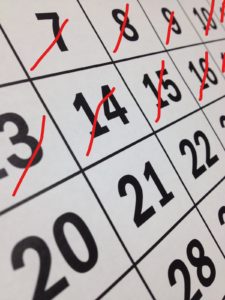 Are you one of the 64% of adults who have failed to keep their new years resolution? Not to worry, there is still time adjust resolutions/goals to achieve success. The first problem with most resolutions is related to specificity. Typically, people tend to set very vague resolutions.
Are you one of the 64% of adults who have failed to keep their new years resolution? Not to worry, there is still time adjust resolutions/goals to achieve success. The first problem with most resolutions is related to specificity. Typically, people tend to set very vague resolutions.
Research shows that the top three resolutions in 2021 were to:
1) exercise more
2) eat healthier
3) lose weight
These seem like great, healthy goals but how will you actually accomplish them? For example, the word “more” in the resolution “exercise more” could mean a lot or a little depending on what kind of exercise you will actually do. SMART goals are resolutions that include a road map for achievement. Here are a few simple strategies can help you achieve your goals for the new year.
SMART Goals
Specific
- Specific relates to the who, what, when, and where.

- Include as many details as possible when you write down your resolution.
- For example, “lose weight” is too broad. This is because there are many activities necessary to lose weight such as adjusting eating habits and physical activity.
- If you have a big goal, break it down further into steps that are measurable and achievable for success.
Measurable
- Measurable goals include numbers that can be counted and tracked.
- It is also important to set up a plan for keeping track of your behavior. For example, you can use an app, a journal, or simply write on a calendar.
- It is important to be able to look back at your progress to celebrate success or gauge when you are ready to adjust your goals.
Attainable
- Goals that you can actually accomplish.

- Identify potential barriers.
- Unrealistic goals can lead to an excuse to quit. For example, if you want to begin exercising, a goal of exercising for an hour every day may be too high. Instead, you could start with an incremental approach like walking three days a week for 20-30 minutes. This incremental approach allows your body to get used to moving and assists in scheduling time for regular exercise.
- Once you have successfully maintained your goal, celebrate your success and set the bar higher.
Relevant
- Relevant goals answer the question “why is this goal important to me?”
- Make a list and put it where it you can see it to keep you motivated.
- Re-visit your “why” on days when you are feeling unmotivated.
Time-bound
- Time-bound goals are evaluated on a specific date.

- Set a reminder on your calendar, app, or journal evaluate your progress.
- The purpose of setting a timeline is to set schedules, not deadlines.
- Review your progress, adjust as needed.
- Self-improvement is a life-long journey.
Turning Resolutions into SMART Goals
Resolution |
Specific: The who, what, and how. |
Measurable: How much/often? |
Attainable: How will you address barriers? |
Relevant: Why is this goal important to you? |
Time-bound: When will you review your progress? |
| Exercise more | Walk around my neighborhood | 3 days/week for 30 minutes at a time | I will walk in the morning because at night I am too tired | I want to be able to chase my grandson in the yard | I will re-evaluate my goal on March 31 |
| Eat healthier | Make half of my plate fruits/veggies | 5 days/week | I will not worry about fruits/veggies on the weekend | My doctor recommended it for my health | I will track my progress and see how I am doing in 1 month |
| Lose weight* | *This goal is too broad. To achieve a goal like weight loss, it must be broken down into more specific steps, such as healthy eating habits and physical activity. | ||||

